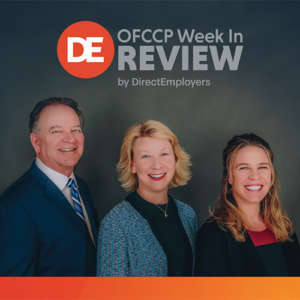 The DE OFCCP Week in Review (WIR) is a simple, fast and direct summary of relevant happenings in the OFCCP regulatory environment, authored by experts John C. Fox, Candee Chambers and Jennifer Polcer. In today’s edition, they discuss:
The DE OFCCP Week in Review (WIR) is a simple, fast and direct summary of relevant happenings in the OFCCP regulatory environment, authored by experts John C. Fox, Candee Chambers and Jennifer Polcer. In today’s edition, they discuss:
- Biden Wins His Third Vaccination Mandate Case, But Loses the First Round of the Federal Contractor/Subcontractor Vaccination Mandate Fight to a Nationwide Injunction: Biden 3; Challengers 5
- 849 HIRE Vets Medallion Recipients Officially Documented
- E-Verify Updated The User Profile For Easier Navigation
- USDOL Announced Global Partnership Initiative For Labor Organizing and Worker Rights
- How Should the NLRB Determine The Appropriateness Of A Petitioned-for Bargaining Unit?
- USDOL and USDOJ Renew MOU To Ensure Military Service Members’ Employment Rights
- What’s A Federal Government Contractor/Subcontractor To Do About The Vaccine Mandate?
- Fall Regulatory Agenda Released – Federal Subcontractors – BEWARE!
- Thought Affirmative Action Plans Were a Cumbersome Part of Being a Federal Government Contractor? Let’s Talk Sustainability.
Monday, December 6, 2021: Biden Wins His Third Vaccination Mandate Case, But Loses the First Round of the Federal Contractor/Subcontractor Vaccination Mandate Fight to a Nationwide Injunction: Biden 3; Challengers 5

The federal Contractor/Subcontractor case decision is: The State of Georgia, et al. vs Joseph R. Biden, et al., CIVIL ACTION NO: 1:21-cv-163 (S.D. Georgia 12/07/2021).
We wrote about the previous vaccination mandate litigation last week spawned in response to four vaccination mandates President Biden put in motion with his issuance of a September 9, 2021 Executive Order 14042 which we wrote about in our September 13, 2021 Week In Review here and here.
This Week’s Vaccination Injunction Puzzle at a Glance:
OSHA Emergency Temporary Standard (“ETS”) Enjoined Nationwide (5th Circuit); OSHA has also Suspended its ETS
- Biden Administration has now asked the Fifth Circuit to lift its injunction pending appeal (not going to happen)
- Employer Comments to OSHA re its Proposed ETS Still Due, But Deadlines Now Extended to January 4, 2022 (recordkeeping requirements) & to January 19, 2022 (all other aspects of the ETS)
Federal Contractor/Subcontractor Vaccine Mandate Enjoined in Two Different Case Decisions: Kentucky (injunction of mandate operating in three states: Kentucky, Ohio and Tennessee), and in Georgia case (nationwide injunction: see full details, below)
- The Biden Administration has filed appeals of these two adverse decisions (to the 5th and 11th Circuits, respectively)
- The appeal to the Fifth Circuit (New Orleans) is to the same U.S. Circuit court which struck down the OSHA ETS (see above)
- The appeal to the 11th Circuit (Atlanta) is to the same Circuit court which UPHELD the CMS vaccination mandate (see below)
- Possible “split in the U.S. Circuit courts” as to the federal contractor/subcontractor vaccination mandate in the offing???
- Three other lawsuits still pending; more injunctions undoubtedly coming
- The Office of Management and Budget has now stayed the federal contractor/subcontractor vaccination mandate nationwide, pending appeal of the Georgia court decision (see story below)
- Federal contractor comments still due to OMB by December 16, 2021 (that is THIS WEEK!)
Medicare/Medicaid Service Provider CMS Vaccine Mandate Enjoined Nationwide (last week) But This Week an Appellate Court Upheld It
- On November 29, 2021, A Missouri court entered an injunction to stop this vaccination mandate in ten states we discussed here
- The Centers for Medicare and Medicaid Services (“CMS”) is a subcabinet-level agency of the U.S. Department of Health and Human Services. CMS responded to President Biden’s EO 14042 by issuing an emergency “Interim Rule” mandating Medicare and Medicaid Service Providers to require their staffs administering Medicare and Medicaid benefits be vaccinated
- A Louisiana case then last week entered an Order which stopped this vaccination mandate with a nationwide injunction
- On Monday December 6, 2021, the United States Court of Appeals for the Eleventh Circuit (Atlanta) then upheld this mandate
- The 11th Circuit case decision, however, operates only in the three states of Alabama, Florida and Georgia
- The 11th Circuit case decision trumps the (lower court) Louisiana District Court decision, but ONLY in the state of Florida as to this case (because only the State of Florida was before the Court in the 11th Circuit case: no other states)
- This is bad news for the challengers to the federal contractor vaccination mandate now facing an appeal of their successful injunction in the federal District Court for Georgia to this appellate court in Atlanta
Federal Employee Vaccine Mandate Case: Courts Have Denied Two Preliminary Injunction Requests to Date
- The U.S. District Court for the District of Columbia denied a request for preliminary injunction brought by 18 federal civilian employees
- In a separate case, the U.S. District Court for the District of Columbia also denied a request for preliminary injunction brought by federal employee and contractor plaintiffs alleging the mandate violated their individual rights under the Rehabilitation Act and the Americans with Disabilities Act
The 11th Circuit Case Decision Denied the State of Florida an Injunction Against the CMS Vaccination Mandate
In this 94-page five-Judge panel opinion, the Court upheld CMS’ Interim Rule mandating vaccinations for employees of Medicare and Medicaid Service Providers. The Court held that the State of Florida had “failed to carry its burden to establish it is entitled to the extraordinary remedy of an Injunction pending appeal.” The Court did not like Florida’s case at all:
“Florida has failed to meet its extremely high burden and clearly establish its entitlement to a preliminary injunction pending appeal. Having carefully considered the relevant factors, we conclude that Florida failed to demonstrate (1) a substantial likelihood that it will prevail on the merits of its appeal from the denial of a preliminary injunction; (2) it will suffer irreparable injury absent an injunction; or (3) the balance of the equities favor an injunction.”
While this decision does not decide the merits of the case (it only addresses the State of Florida’s request for an injunction to stop the CMS mandate in Florida), it does at least preliminarily foreshadow the Court’s thinking about the merits of the case. In any request for an injunction, a litigant seeking the injunction must show that it has a high likelihood of success on the merits of the underlying dispute between the parties. While this is only a preliminary finding, of course, the Court’s first holding in the Florida case that “Florida failed to demonstrate (1) a substantial likelihood that it will prevail on the merits of its appeal from the denial of a preliminary injunction” is devastating to the challengers seeking to stop the CMS vaccination mandate. When a lawyer loses an injunction s/he brought and obviously would not have brought if s/he did not think they could win, it is like getting hit by a ton of bricks.
THE APA “Rulemaking” Avoidance Issue Raises its Head, Yet Again
On the bright side for challengers to the various vaccine mandates which have proceeded without Rulemaking (i.e., public Notice and Comment pursuant to the Administrative Procedure Act: “APA”), Judge Lagoa wrote in dissent that he thought the State of Florida “has a strong likelihood of success on the issue that CMS violated the APA by bypassing the notice-and-comment requirements.” (slip op at p. 25) NOTE: CMS had invoked a “good cause” exception to otherwise required Rulemaking which exception the APA allows when Rulemaking would be “impracticable, unnecessary, or contrary to the public interest.” This is the same legal issue haunting the OSHA ETS and the White House after-the-fact “Hail Mary Pass” to OMB to issue proposed “emergency” Rules after having first ordered up the federal contractor/subcontractor vaccination mandate via Website Notices, written memos, FAQs and Press Releases. (Really! You cannot make this up.)
The Georgia District Court Decision Enjoined the Federal Contractor/Subcontractor Vaccination Mandate Nationwide
In this 28-page opinion involving a wide spectrum of challengers (including seven states (Georgia, Alabama, Idaho, Kansas, South Carolina, Utah and West Virginia), several of the governors of those states, and several state agencies within those states), the Court recognized the toll the COVID-19 virus had wrought on the American people. It then concluded, however, in a memorable quote that:
“However, even in times of crisis this Court must preserve the rule of law and ensure that all branches of government act within the bounds of their constitutionally granted authorities. Indeed, the United States Supreme Court has recognized that, while the public indisputably “has a strong interest in combating the spread of [COVID-19],” that interest does not permit the government to “act unlawfully even in pursuit of desirable ends.”
* * * * * *
In this case, Plaintiffs will likely succeed in their claim that the President exceeded the authorization given to him by Congress through the Federal Property and Administrative Services Act when issuing Executive Order 14042.” (slip op at p. 2)
Editor’s Note: The Federal Property and Administrative Services Act is colloquially known as the Federal Procurement Act…and is President Johnson’s claimed source of authority to have allowed him to have issued Executive Order 11246 in 1965. Should the federal contractor vaccination mandate make it to the SCOTUS for review, court watchers will also be watching the Court’s decision as it discusses the breadth and limits of a President’s power under the Federal Procurement Act. The Georgia Court went right at this foundational issue as to the vaccine mandate and drew a tight limit on the powers of the President:
“The Court finds that Plaintiffs have a likelihood of proving that Congress, through the language it used, did not clearly authorize the President to issue the kind of mandate contained in EO 14042 [Editor’s Note: Executive Order 14042 is the fountainhead of the vaccination mandate], as EO 14042 goes far beyond addressing administrative and management issues in order to promote efficiency and economy in procurement and contracting, and instead, in application, works as a regulation of public health, [fn omitted] which is not clearly authorized under the Procurement Act.” [fn omitted] (slip op at p. 20)
Indeed, in support of its finding that President Biden was skating on thin ice in citing to the Federal Procurement Act as the source of his power to issue Executive Order 14042, the Georgia Court cited to a case decision from the United States Court of Appeals for the Fourth Circuit (Richmond) which had previously struck down Executive Order 11246 as unconstitutional:
“The President’s directives still must be “reasonably related” to the purposes of the Procurement Act, Liberty Mut. Ins. Co. v. Friedman, 639 F.2d 164, 170 (4th Cir. 1981) (emphasis added), and Defendants have not cited to a case upholding the use of the Procurement Act “to promulgate such a wide and sweeping public health regulation as mandatory vaccination for all federal contractors and subcontractors,” [citation omitted] Nor have Defendants cited to a case upholding some action or requirement undertaken pursuant to the Procurement Act that the Court finds analogous to the mandates in EO 14042.” (slip op at p. 22)
Editor’s Note: The Liberty Mutual court decision did not use the bruising language that Executive Order 11246 was unconstitutional. Rather, it softened its language in holding that Executive Order 11246 could not be enforced against Liberty Mutual, even though the Court found the company to be a covered federal Government “subcontractor,” holding (in lawyer-speak) that Executive Order 11246 lacked a “sufficient nexus” to the purposes of the Federal Procurement Act to serve as the source of authority for President Johnson to have seized upon it as the source of his delegated power to require federal contractors to engage in Affirmative Action and non-discrimination in employment.
The Biden Administration is Playing with Fire, and the Legitimacy of Executive Order 11246 Could Well Be Eventually at Stake
The legal argument has become that the Biden Administration is seizing upon the Federal Procurement Act to justify social policy objectives it cannot get from the Congress for whatever good, bad or other reason. In the process, whether it realizes it or not, challenges to President Biden’s Executive Orders relying on the Federal Procurement Act are again raising attention to what former SCOTUS Chief Justice Rehnquist has already described as the “somewhat obscure” origins of the congressional authority for Executive Order 11246. (See Chrysler Corp v. Brown, 441 U.S. 281, 304 (1979). And wait until you see this Federal Procurement Act authority issue be called up front and center in the coming litigation over President Biden’s “carbon neutral” Executive Order, reported below in this WIR. That EO involves real money and government contractors are going to spare no expense to fight that battle.
Clearly, much more clarity about the President’s authority, and the limits of that authority, under the Federal Procurement Act is coming. Clients have always taught me to NEVER put the company into litigation which has the potential to be “enterprise threatening.” Even a 1% chance of a company-ending result is unacceptable. The Biden White House, it appears, likes to take the big gambles prior Presidents have been loath to take, in an abundance of caution.
The Two Federal Employee Vaccine Mandate Wins For Biden
- The U.S. District Court for the District of Columbia denied a request for preliminary injunction brought by 18 federal civilian employees and two active-duty Marines seeking to prevent enforcement of vaccine mandates imposed on federal government employees
- The injunction was not warranted as all plaintiffs had requested an exemption from the mandate which were still pending; thus, their claims were not ripe for litigation since none had experienced any injury from the mandate to date nor been disciplined.
- Furthermore, because plaintiffs had yet to exhaust their administrative appeal remedies, any potential adverse employment action was not imminent or severe at the time of the court’s ruling.
- Finally, the court held that in balancing the potential harm to plaintiffs and the public interest, the public interest carries the most weight. The court determined “enjoining the federal employee vaccine mandate could risk sickening swathes of the civil service, prolonging remote work, impeding public access to government benefits and records, and slowing governmental programs.” Such concerns, and the need to stem the spread of COVID-19, outweigh the plaintiffs’ pecuniary interests.
- In a separate case, the U.S. District Court for the District of Columbia also denied a request for preliminary injunction brought by federal employee and contractor plaintiffs alleging the mandate violated their individual rights under the Rehabilitation Act and the Americans with Disabilities Act.
- The court found the plaintiffs had not suffered irreparable harm, given that the plaintiffs’ potential termination was neither imminent nor certain since none of the plaintiffs had gotten a date for potential adverse employment action.
- The court also determined that mandatory vaccinations are a suitable expression of the public interest in health and safety, and that such public interest outweighs plaintiffs’ failure to show irreparable harm.
Monday, December 6, 2021: 849 HIRE Vets Medallion Recipients Officially Documented

VETS received 870 applications for the Award in 2021. Among the 870 applications, 849 were approved for an award, with 15 applications denied and six withdrawn by the applicant. Of the 849 applications approved for an award, the breakdown by award type is as follows:
- 301 small gold (SG),
- 159 small platinum (SP),
- 175 medium gold (MG), 126 medium platinum (MP),
- 70 large gold (LG), and
- 18 large platinum (LP).
How We Got Here
- November 2021: USVETS Honors 849 Companies With 2021 Hire Vets Medallion Awards!
- August 2021: Sample Application Now Available for “HIRE Vets Medallion Award.”
Mark Your Calendars
The 2022 application window runs from January 31, 2022, to April 30, 2022.
Monday, December 6, 2021: E-Verify Updated The User Profile For Easier Navigation
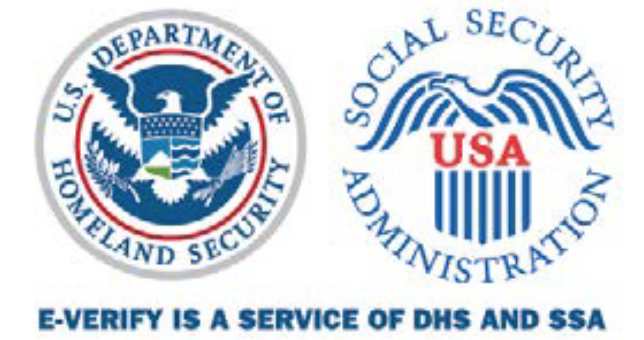
- User Profile Information;
- Update/Change Password; and
- Update/Change Password Challenge Questions and Answers.
E-Verify users are now able to view and complete these actions from a consolidated user profile screen. This enhancement allows users to view all their account information quickly and easily without navigating to multiple pages.
Users are able to access their profile information from the E-Verify Home page by clicking on the drop-down arrow next to their name and selecting “User Account.”
This update impacts all E-Verify users.
Tuesday, December 7, 2021: USDOL Announced Global Partnership Initiative For Labor Organizing and Worker Rights
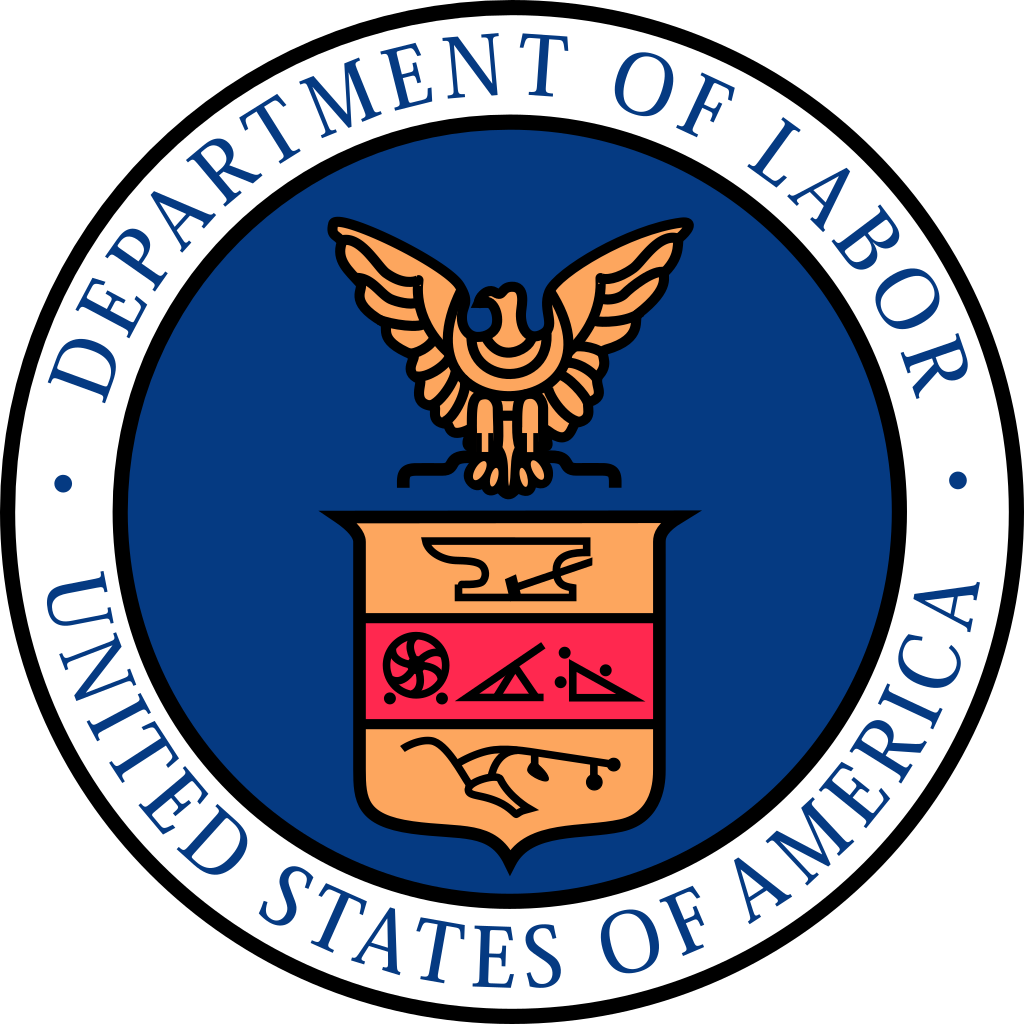
The collaborators, including governments, worker organizations, and labor stakeholders, aim to:
- strengthen free and independent trade unions;
- support labor law reform and enforcement;
- promote worker organizing and innovative use of collective bargaining; and
- extend labor law coverage to protect workers employed in low-wage jobs and sectors often excluded from labor law protections.
The Summit For Democracy
President Biden opened the first-ever Summit for Democracy by announcing the Presidential Initiative for Democratic Renewal. The Summit, which included leaders from around the world, provided the opportunity to discuss the challenges and opportunities facing democracies in the 21st century. The United States hosted the event on December 9-10, 2021.
For more information on the Presidents’ Initiatives from the Summit for Democracy, check out:
- Fact Sheet: Announcing the Presidential Initiative for Democratic Renewal
- Fact Sheet: Export Controls and Human Rights Initiative Launched at the Summit for Democracy
- Remarks by President Biden at the Summit for Democracy Closing Session
Tuesday, December 7, 2021: How Should the NLRB Determine The Appropriateness Of A Petitioned-for Bargaining Unit?
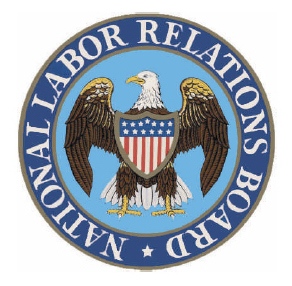
The Case History
- 2021 (today): American Steel Construction 371 NLRB No. 41 (request for briefs)
- 2019: The Boeing Co., 368 NLRB No. 67 (standard revised)
- 2017: PCC Structurals 365 NLRB No. 160 (the Board overruled the prior standard)
- 2011: Specialty Healthcare & Rehabilitation Center of Mobile, 357 NLRB 934 (standard initially determined)
The Questions At Hand
The Board invites the filing of briefs to allow the parties and interested amici curiae (essentially interested parties) to address the following questions:
- Should the Board adhere to the unit-determination standard in PCC Structurals, Inc., 365 NLRB No. 160 (2017), as revised in The Boeing Company, 368 NLRB No. 67 (2019)?
- If not, what standard should replace it? Should the Board return to the standard in Specialty Healthcare, 357 NLRB 934 (2011), either in its entirety or with modifications?
The Board’s Stance
Chairman McFerran and Members Wilcox and Prouty issued the notice and invitation. Members Kaplan and Ring dissented.
The Filing Deadlines
- January 21, 2022: Parties and amici may file briefs electronically on nlrb.gov not exceeding 20 pages
- February 7, 2022: The parties (but not amici) may file responsive briefs not exceeding 30 pages. No other responsive briefs will be accepted.
Wednesday, December 8, 2021: USDOL and USDOJ Renew MOU To Ensure Military Service Members’ Employment Rights
The U.S. Department of Labor’s Veterans’ Employment and Training Service (VETS) and the U.S Department of Justice’s Civil Rights Division announced a renewed Memorandum of Understanding (MOU) reaffirming their commitment to administer and enforce the protections afforded to military service members and veterans by the Uniformed Services Employment and Reemployment Rights Act of 1994 (USERRA).
Among other things, the 8-page document outlines the roles of the USDOL and USDOJ to carry out their responsibilities under USERRA in cases where a person has alleged that a State, local government, or private employer has violated USERRA. It also establishes guidelines for cooperation between USDOL and USDOJ to provide “expeditious representation for service members in all meritorious USERRA cases.” The MOU supersedes the 2004 MOU and will expire if not renewed or modified on December 31, 2024.
“Service members and veterans have made great sacrifices to guarantee the freedoms and liberties that all Americans enjoy,” said U.S. Department of Justice’s Civil Rights Division Assistant Attorney General Kristen Clarke. “They are guaranteed the right to civilian employment free from discrimination based on their military service and prompt reemployment following their military deployments. Through our strong partnership with the Department of Labor’s Veterans’ Employment and Training Service, we will continue to identify Uniformed Services Employment and Reemployment Rights Act claims, prosecute employers who violate the law, seek relief for victims, and fight to eliminate discrimination based on military service from the workplace.”
USERRA
USERRA is the federal law that establishes the rights and responsibilities for uniformed service members and their civilian employers.
Thursday, December 9, 2021: What’s A Federal Government Contractor / Subcontractor To Do About The Vaccine Mandate?
Due to the nationwide injunction of the federal contractor/subcontractor vaccination mandate, (see story above), the Office of Management and Budget issued new guidance TO STOP the implementation of the federal government contractor and subcontractor vaccination mandate President Biden’s Executive Order 14042 had earlier ordered up. The new guidance, found on the Safer Federal Workforce Taskforce website, aims to ensure compliance with applicable Court Orders and Injunctions, including those that are preliminary and may be supplemented, modified, or vacated, depending on the course of ongoing litigation.
The Bottom Line
The federal Government contractor/subcontractor vaccination mandate is stayed nationwide (see definition, below). However, those persons entering onto federal lands or buildings must nonetheless follow safety and health rules applicable to those federal properties. See the Safer Federal Workforce Note at the bottom of this story.
The New Guidance
Here is the guidance verbatim:
“For existing contracts or contract-like instruments (hereinafter “contracts”) that contain a clause implementing requirements of Executive Order 14042:
The Government will take no action to enforce the clause implementing requirements of Executive Order 14042, absent further written notice from the agency, where the place of performance identified in the contract is in a U.S. state or outlying area subject to a court order prohibiting the application of requirements pursuant to the Executive Order (hereinafter, “Excluded State or Outlying Area”). In all other circumstances, the Government will enforce the clause, except for contractor employees who perform substantial work on or in connection with a covered contract in an Excluded State or Outlying Area, or in a covered contractor workplace located in an Excluded State or Outlying Area.”
Currently Excluded States and Outlying Areas:
All of the United States and its outlying areas, including (essentially every U.S. state and federal possession, other than the U.S. Space Station orbiting in space):
- The fifty States;
- The District of Columbia;
- The commonwealths of Puerto Rico and the Northern Mariana Islands;
- The territories of American Samoa, Guam, and the United States Virgin Islands; and
- The minor outlying islands of Baker Island, Howland Island, Jarvis Island, Johnston Atoll, Kingman Reef, Midway Islands, Navassa Island, Palmyra Atoll, and Wake Atoll.
Note: Federal agency COVID-19 workplace safety protocols for Federal buildings and Federally controlled facilities still apply in all locations. Contractor employees working onsite in those buildings and facilities must still follow Federal agency workplace safety protocols when working onsite.”
What’s Next?
The Biden Administration has appealed the Georgia federal Court decision enjoining nationwide the federal contractor/subcontractor vaccination mandate. The Biden Administration has also appealed the earlier Kentucky federal District Court decision we reported last week and which had enjoined the federal contractor/subcontractor vaccination mandate in only three states (Kentucky, Ohio and Tennessee).
The Georgia appeal shows the earliest promise for the Biden Administration since that appeal will lie to the United States Court of Appeals for the Eleventh Circuit (Atlanta). This is the same Court in which, last week, a 5-Judge panel of that Court gave the Biden Administration its first win in a vaccination lawsuit. Specifically, that 11th Circuit panel UPHELD the Interim Rule mandating vaccinations of Medicare and Medicaid Service Providers the Health & Human Services Administration’s Centers for Medicare & Medicaid Services (“CMS”) had published. See above vaccination case decisions update story.
The Biden Administration’s appeal of the Kentucky court’s three-state injunction will lie to the Fifth Circuit Court of Appeals headquartered in New Orleans. That is bad news for the Biden Administration. A 3-Judge panel of that Court, you will recall, handed down the Biden Administration’s first vaccination mandate defeat in the courts when it struck down on November 9, 2021 the USDOL’s Occupational Safety And Health Administration’s Emergency Temporary Standard, as we reported here.
If the Fifth Circuit were to strike down the federal contractor/subcontractor vaccination mandate and the Eleventh Circuit were to uphold the same federal contractor/subcontractor vaccination mandate, the two decisions would create the proverbial “split” in the federal circuit courts. Such a “split in the circuits” on a matter of major national importance is often the pre-requisite prompting the SCOTUS to exercise its discretion to hear appeals brought to the nation’s highest court for resolution.
So, watch closely the progress of these two cases. These cases could ripen into THE CASES going up to the SCOTUS for resolution.
Friday, December 10, 2021: Fall Regulatory Agenda Released – Federal Subcontractors – BEWARE!
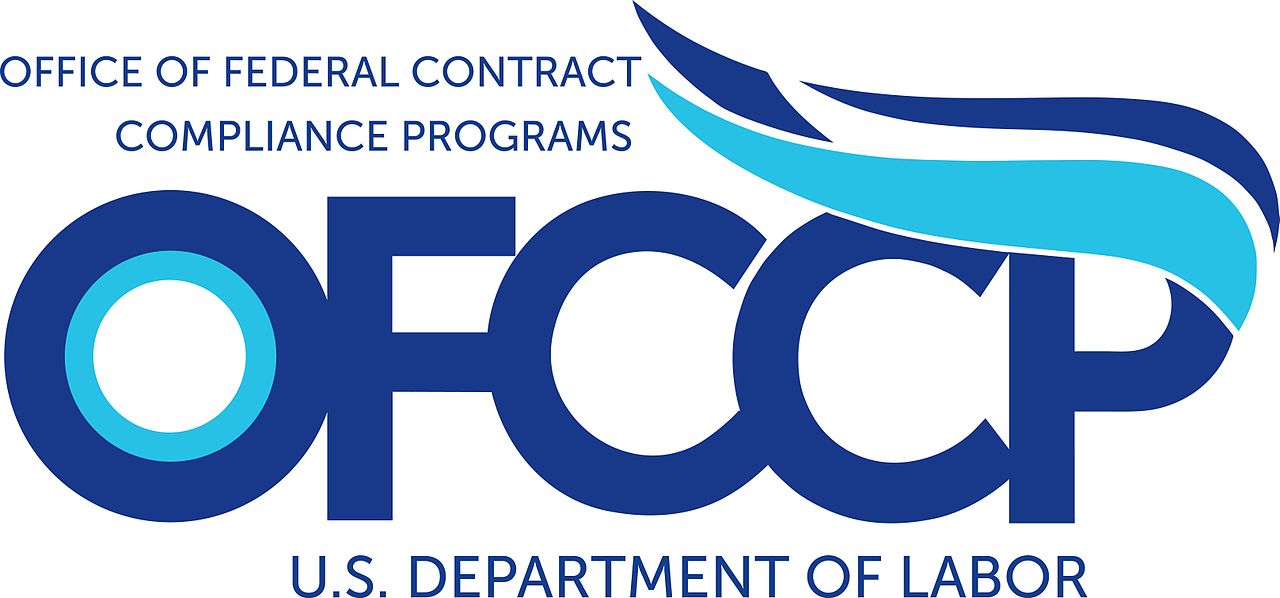
OFCCP had three “Proposed Rules” and one “Long-term Action” in the earlier Spring Agenda. The new agenda holds five “Proposed Rules,” thus adding two to the Spring Agenda, and also projecting one “Final Rule.” Of particular interest is item #5 below, which OFCCP has designed to seek to force federal subcontractors out of the shadows.
Here’s the scoop:
Proposed Rule Stage
- (Old News) Rescission of Certain Provisions Related to the Religious Exemption for Federal Contractors and Subcontractors (1250-AA09)You may recall seeing this one on the Spring Agenda, which we headlined in June 2021: “HERE IT COMES: OFCCP Plans to Modify Its PDN And Religious Exemption Rules.” The comment period closed yesterday (December 9th). Get up to speed on this topic in our in-depth breakdown from last month (November 8th) “OFCCP Published its Draft Proposal to Rescind the Trump OFCCP Religious Exemption Rule, and Not Replace It.”
- (New) Access to Records Regulatory Updates (1250-AA12) OFCCP will propose to “make changes to 41 CFR parts 60-1 and 60-40 in order to bring OFCCP’s Freedom of Information Act regulations in line with relevant legal authorities and precedential case law, and to ensure consistency among OFCCP’s regulations on access to records.”
Expected Time Frame: September 2022
- (Old News) Modernizing Affirmative Action Programs, Recordkeeping, and Other Components of the Executive Order 11246 Supply and Service Obligations for Federal Contractors and Subcontractors (1250-AA13) Another holdover from the Spring Agenda, OFCCP hopes this Proposal will bring “changes to modernize its Executive Order 11246 compliance program for federal supply and service contractors and subcontractors, including but not limited to recordkeeping and affirmative action program obligations. In addition, the proposal will consider modifications in light of Executive Order 13988, Preventing and Combating Discrimination on the Basis of Gender Identity or Sexual Orientation.”
Expected Time Frame: September 2022
- (Old News) Modification of Procedures to Resolve Potential Employment Discrimination (1250-AA14) This Proposal would “modify certain provisions” in the November 2020 Final “PDN Rule,” as noted above in the report of OFCCP’s intent to rescind the Religious Discrimination Rule. Get the scoop on that Rule from our story “OFCCP Final “PDN Rule” Now Final.” In addition, the Proposal would “make other related changes to the pre-enforcement notice and conciliation process. The proposal will promote effective enforcement through OFCCP’s regulatory procedures,” OFCCP proclaims.
Expected Time Frame: February 2022 (So, allegedly coming soon).
Prediction: Covered federal Government Contractors will not like this OFCCP proposal when it sees the light of day.
- (New) Notification of Supply and Service Subcontract Awards (1250-AA15) This OFCCP Proposal would “add provision(s) to the regulations implementing Executive Order 11246 requiring contractors to provide notice to OFCCP when they award supply and service subcontracts. The notice would include information currently unavailable to OFCCP, enabling it to schedule supply and service subcontractors for compliance evaluations.”
Interesting to this Rule is the CFR Citation is “Not Yet Determined,” and there is no “Statement of Need.”
Expected Time Frame: April 2022
Prediction: This Rule will backfire on OFCCP because it will force covered federal contractors to realize how narrow OFCCP’s federal “subcontractor” definition actually is. OFCCP’s Rules adopt a confusing two-part definition allowing companies to be captured as a “subcontractor” under EITHER definition. The first definition captures as covered federal Government subcontractors those companies which “subsume” (i.e., take over and perform) the prime federal contract or a portion of it, or subsume a covered federal Government subcontract, or a portion of it. There are very few of these contracts relatively speaking, except in construction.
The second definition, though, is where the action is. It captures as a subcontractor those contracts a company signs which are “necessary to” the performance of a prime federal contractor’s contacts or covered federal Government subcontracts. However, through litigation, the USDOL’s Solicitor’s Office has narrowed down this second definition of “subcontractor” appearing at 41 CFR Section 60-1.3 to cover ONLY those services and supplies, and construction services which are “legally necessary.”
As a result, many subcontractors which thought they were covered by OFCCP Rules under the second definition will soon learn they have been only “voluntarily” complying and not because OFCCP’s Rules required their submission to OFCCP’s Rules. The presumed federal contractor / subcontractor universe will thus narrow and shrink, yet again. Many AAP vendors will lose AAP business as enlightenment overtakes them and causes them to advise their clients/customers that the company is not a federal Government “subcontractor” “legally necessary to” the performance of a covered federal Government contract or covered federal Government subcontract.
Final Rule Stage
- (New; technical) Technical Amendments to OFCCP Regulations (1250-AA16)
For all of you who keep the hard copy of your Code of Federal Regulations nearby, you’ll be excited to know that some of the nuances driving you crazy (or is that just us?) will soon be corrected!
This Rule will make the technical corrections to update jurisdictional thresholds for Section 503 of the Rehabilitation Act and the Vietnam Era Veterans’ Readjustment Assistance Act. OFCCP will also correct OMB control numbers for OFCCP information collection requirements and remove gender assumptive pronouns.
Monday, December 13, 2021: Thought Affirmative Action Plans Were a Cumbersome Part of Being a Federal Government Contractor? Let’s Talk Sustainability.

Overview of EO 14057
In a nutshell, President Biden wants the Federal Government to “lead by example” to combat what this White House sees, (as many other nation state leaders do) as a “climate crisis.” How? By setting the following benchmarks:
- a carbon pollution-free electricity sector by 2035, and
- a net-zero emissions economy-wide by no later than 2050.
How Will This Effect Federal Government Contractors/Subcontractors?
As President Biden points out, “Leading the Nation on a firm path to net-zero emissions by 2050…will require bold action to transform Federal procurement and operations and secure a transition to clean, zero-emission technologies.” (emphasis added).
Section 102 of the Order goes on to break down the “Government-wide Goals” in which the “Federal Government shall use its scale and procurement to achieve.” These goals include “net-zero emissions from Federal procurement, including a Buy Clean policy to promote use of construction materials with lower embodied emissions.” (emphasis added).
“Sec. 208. Sustainable Acquisition and Procurement. (a) Agencies shall reduce emissions, promote environmental stewardship, support resilient supply chains, drive innovation, and incentivize markets for sustainable products and services by prioritizing products that can be reused, refurbished, or recycled; maximizing environmental benefits and cost savings through use of full lifecycle cost methodologies; purchasing products that contain recycled content, are biobased, or are energy and water efficient, in accordance with relevant statutory requirements; and, to the maximum extent practicable, purchasing sustainable products and services identified or recommended by the Environmental Protection Agency (EPA).” (emphasis added)
What Does This All Mean?
In simple terms, yet not so simple actions, to secure federal government contracts/subcontracts moving forward, not only are your products and services going to be scrutinized to meet all of these new climate-friendly rules, but also the way the company operates as a whole. All segments of the company, including HR, will be drawn into the quest for carbon neutrality.
As but one example, are Recruiters still jet-setting to hiring venues and interviews around the country and around the Globe, which we now know (given the operational shifts from COVID-19) that companies may often successfully manage virtually? Virtual attendance saves not only the wear and tear on the traveler, but also our environment.
Are you printing and filing documents that could be stored online, obviating the need for printer paper, carbon-based ink, and filing cabinets? Are your drivers or other vehicle operation staff using electric vehicles? Will you be tasked to hire an entirely new line of professionals – those with the expertise to transition your operations to net zero emissions?
The Bottom Line
HR be prepared, in addition to that search for a Chief Accessibility Officer you’ve had on your plate…be prepared to take a deep dive into your internal processes, this time, not for barriers to employment but for barriers to sustainability. You may also want to start drafting a job description for your new Chief Sustainability Officer and a team to staff this new coming department.
THIS COLUMN IS MEANT TO ASSIST IN A GENERAL UNDERSTANDING OF THE CURRENT LAW AND PRACTICE RELATING TO OFCCP. IT IS NOT TO BE REGARDED AS LEGAL ADVICE. COMPANIES OR INDIVIDUALS WITH PARTICULAR QUESTIONS SHOULD SEEK ADVICE OF COUNSEL.
SUBSCRIBE.
Compliance Alerts
Compliance Tips
Week In Review (WIR)
Subscribe to receive alerts, news and updates on all things related to OFCCP compliance as it applies to federal contractors.
OFCCP Compliance Text Alerts
Get OFCCP compliance alerts on your cell phone. Text the word compliance to 55678 and confirm your subscription. Provider message and data rates may apply.
